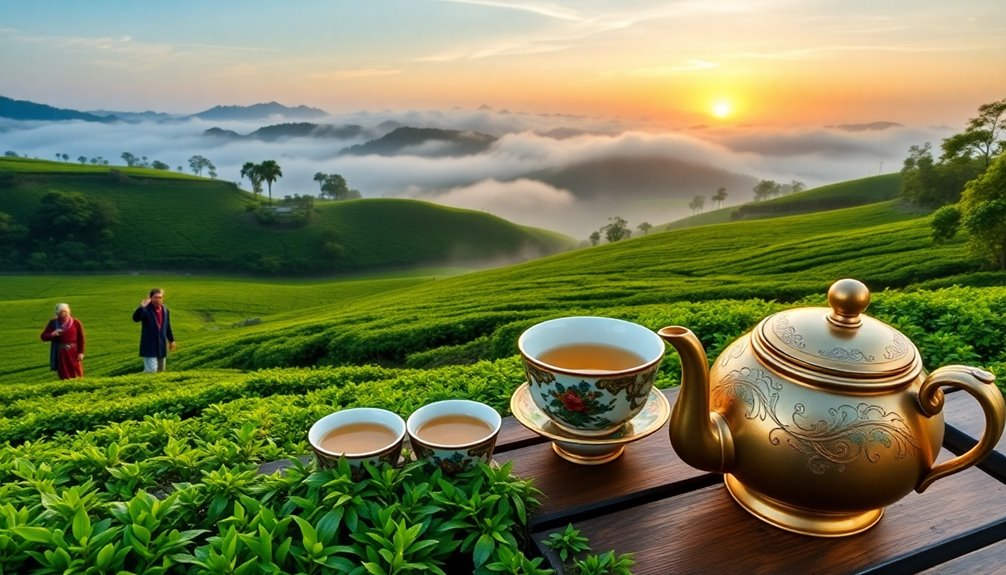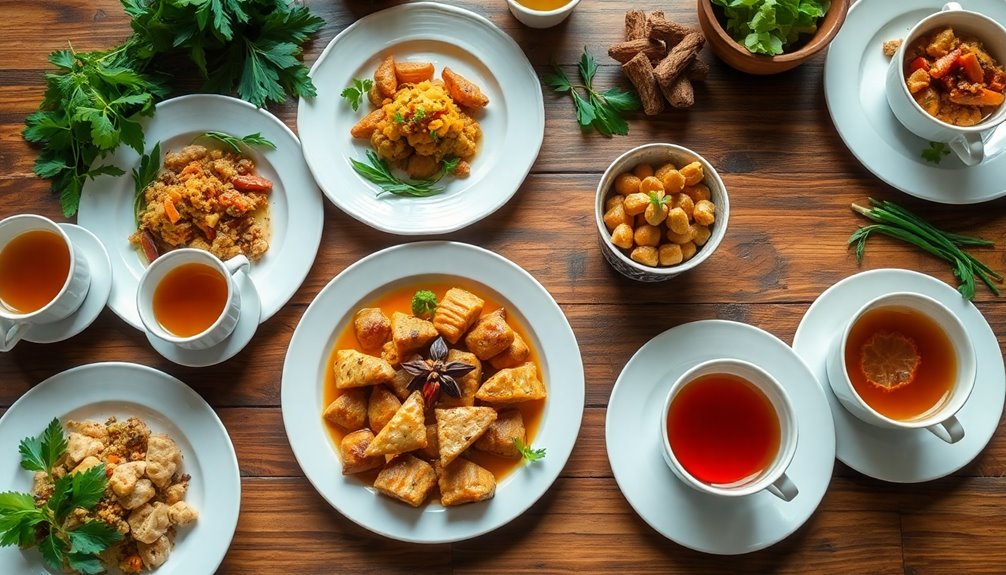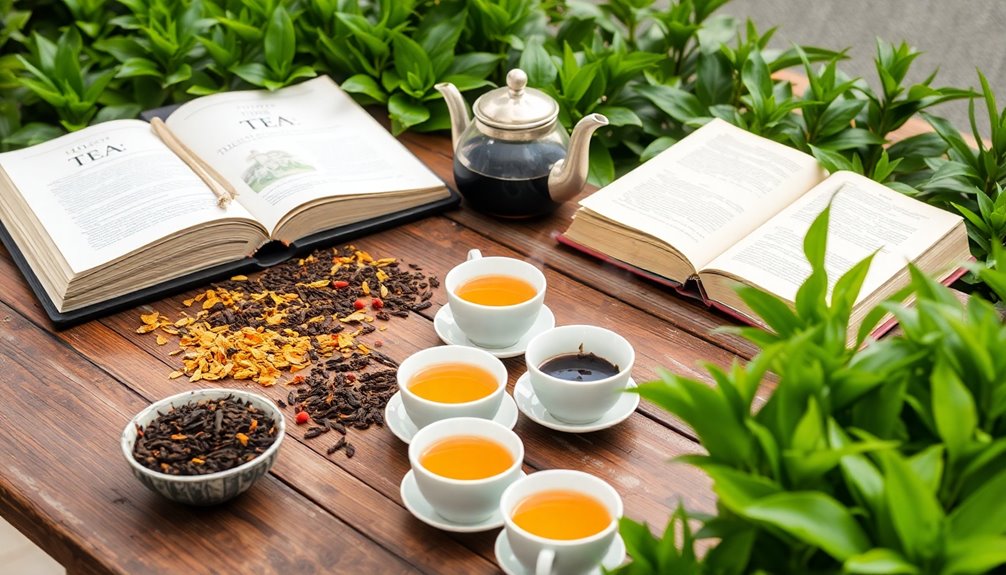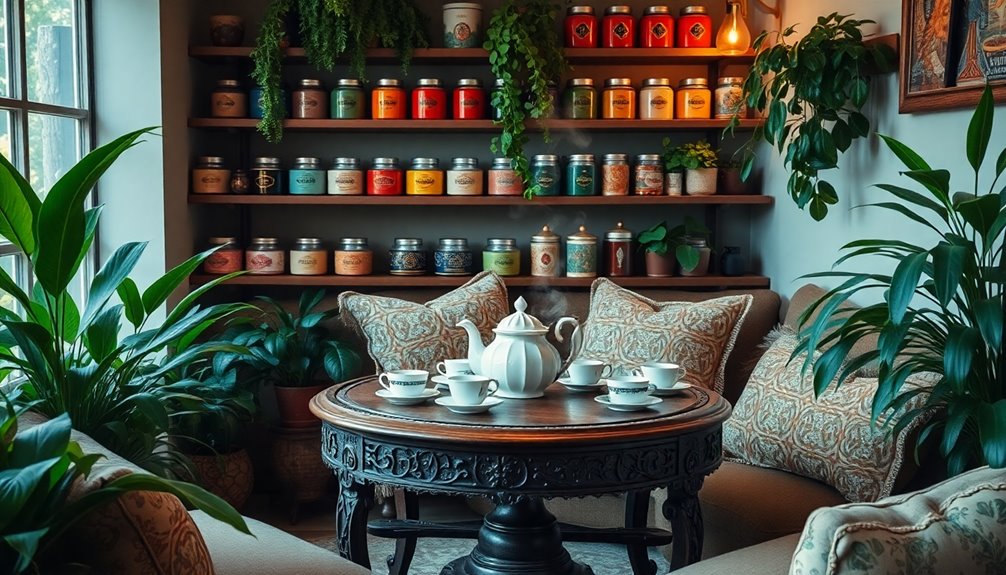In this captivating bestseller, you discover the fascinating history of tea, tracing its roots back to ancient China and the legendary Emperor Shen Nong. You’ll see how tea evolved from a local brew into a global phenomenon, influencing cultures from Japan’s serene tea ceremonies to Britain’s iconic afternoon tea tradition. The book explores tea’s role in trade, highlighting the British East India Company’s monopoly and the protest of the Boston Tea Party that stirred revolution. It also unveils the darker aspects of colonial exploitation in tea production. Keep going, and you’ll uncover even more intriguing facts about this beloved beverage.
Key Takeaways
- The book explores tea’s origins, tracing its discovery by Emperor Shen Nong in 2737 BC and its rise in Chinese culture.
- It highlights the cultural significance of tea rituals across different countries, such as Japan’s tea ceremonies and British afternoon tea traditions.
- The narrative delves into tea’s role in trade history, including the British East India Company’s monopoly and the impact of the Boston Tea Party.
- It addresses the political influence of tea in Britain, particularly its role in social integration and the unrest caused by taxation.
- The book examines the colonial exploitation of tea production, detailing oppressive practices and the introduction of indentured labor in tea plantations.
Introduction
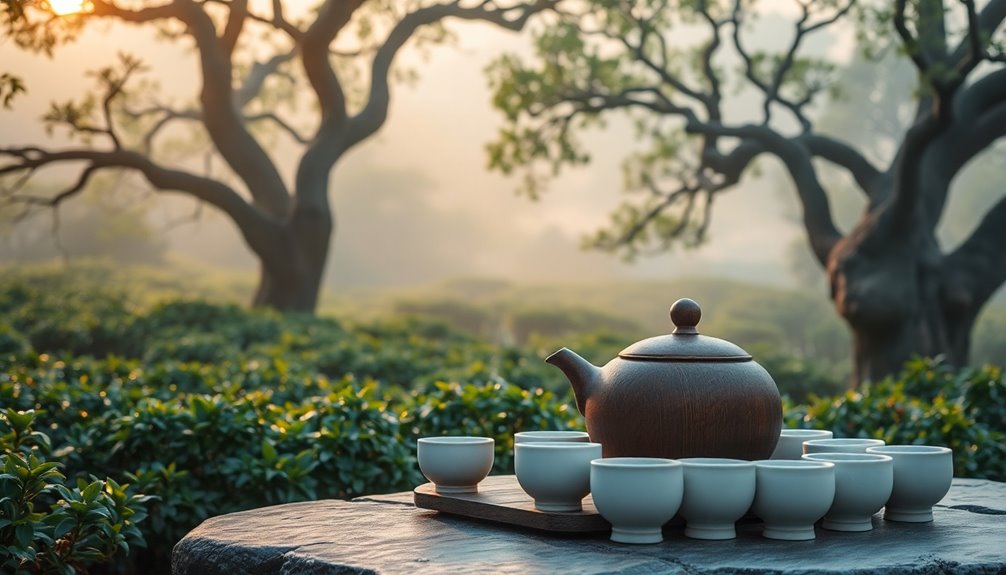
Tea, a simple leaf that’s transformed cultures and economies, has a rich and fascinating history. As you delve into the “True History of Tea,” you’ll discover its ancient origins tracing back to 2737 BC, when Emperor Shen Nong accidentally stumbled upon this delightful beverage.
The history of tea unfolds in China, where its significance was recognized early on, notably during the Han dynasty (206 BC – 220 AD), with artifacts proving its importance found in tombs.
Fast forward to the Tang dynasty (618-906 AD), and you’ll see tea evolving into a national drink, leading to the publication of the first book about tea, “Cha Ching,” by Lu Yu. This pivotal moment highlights not just the beverage’s popularity but also its cultural significance of tea within Chinese society.
The journey of tea didn’t stop in China; it reached Europe in the 16th century, with the Dutch first commercially shipping it in 1606.
The British East India Company later monopolized imports, shaping tea’s popularity in Britain by the mid-17th century. By exploring these moments, you can appreciate the profound impact tea has had throughout history.
Tea’s Cultural Significance Globally

Throughout the world, tea holds a special place in various cultures, serving as more than just a beverage. It offers a means to connect with history and tradition, reflecting the unique values of different societies.
In Japan, the tea ceremony embodies Zen principles and mindfulness, emphasizing harmony and ritual. Meanwhile, in India, chai is a daily staple, with regional variations showcasing the country’s rich culinary heritage through diverse flavors and spiced blends.
British tea, particularly the Afternoon Tea tradition, emphasizes social gatherings, complete with light snacks like scones, making it an essential part of British culture. In the Middle East, tea symbolizes hospitality, with preparations like Moroccan Mint Tea and Turkish Çay varying across countries, highlighting the social aspect of tea consumption.
Each type of tea—whether it’s Chinese Green Tea, Indian Masala Chai, or Japanese Matcha—carries historical and cultural significance. These drinks aren’t just refreshments; they’re an integral part of rituals and ceremonies, illustrating the identity of each region.
Indeed, tea is the drink that changed the way people interact and connect, fostering relationships across the globe.
Tea’s Role in Trade History
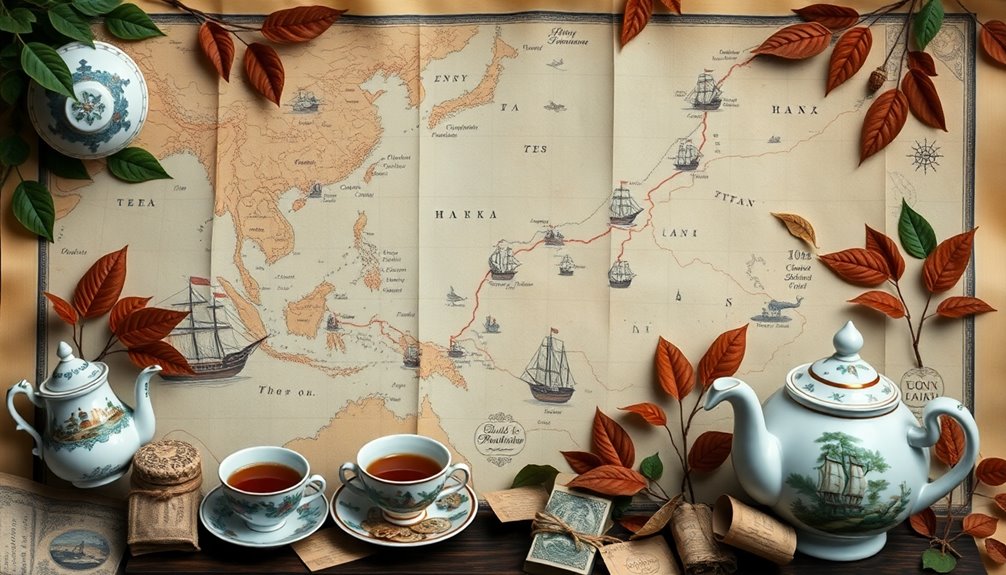
As you explore the cultural significance of tea, it’s clear that this beverage also played a pivotal role in shaping global trade dynamics. The British East India Company, established in 1600, monopolized the tea trade and elevated tea to a luxury item in Europe.
This monopoly significantly influenced global commerce, as high taxation on tea in Britain beginning in 1689 led to rampant smuggling, with illegal imports reaching about 7 million pounds annually.
The Boston Tea Party of 1773 was a direct response to these oppressive taxes. It not only highlighted the beverage’s importance in political and social contexts but also ignited the American Revolution.
After the East India Company lost its monopoly in 1834, India emerged as a key player in the tea trade, especially with the cultivation of Assam tea, which became highly sought after.
In the mid-19th century, the introduction of tea clippers revolutionized trade, sparking competitive races between British and American merchants to transport tea quickly from China to Europe.
This dynamic not only transformed the tea trade but also reshaped global commerce, showcasing tea’s lasting impact on the world. Furthermore, the tea industry today is worth approximately $200 billion, reflecting its enduring significance in the global market.
Tea’s Influence on British Politics
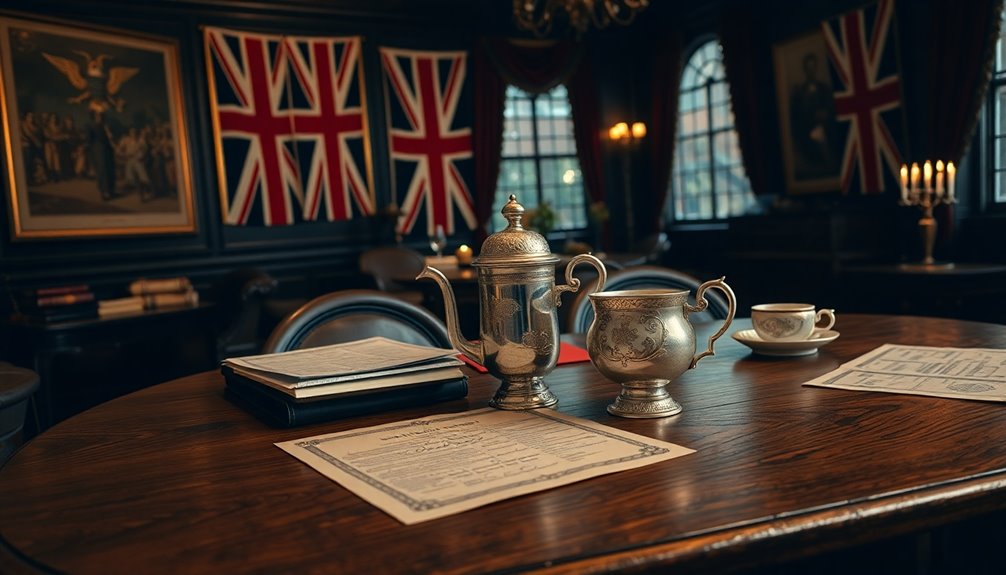
A significant aspect of British politics can be traced through the lens of tea consumption and its associated events. Tea drinking became an integral part of the British way of life, shaping social gatherings where political discussions often thrived. The high taxation on tea, which began in 1689, not only led to widespread smuggling and organized crime but also fueled social unrest, impacting the political landscape significantly.
One of the most notable events linked to tea and politics is the Boston Tea Party of 1773. This act of defiance against British taxation saw colonists dumping tea into Boston Harbor, igniting the flames of the American Revolution.
Meanwhile, the London Tea Auction, established in the 18th century, emerged as a commercial cornerstone that influenced tea prices and shaped British culture.
During both World Wars, tea’s role as a morale booster for troops and civilians alike cemented its importance in national identity. The act of sharing a cup of tea became a silent yet powerful symbol of unity, proving that tea isn’t just a beverage but a catalyst for political dialogue and change throughout British history.
Colonial Exploitation of Tea Production
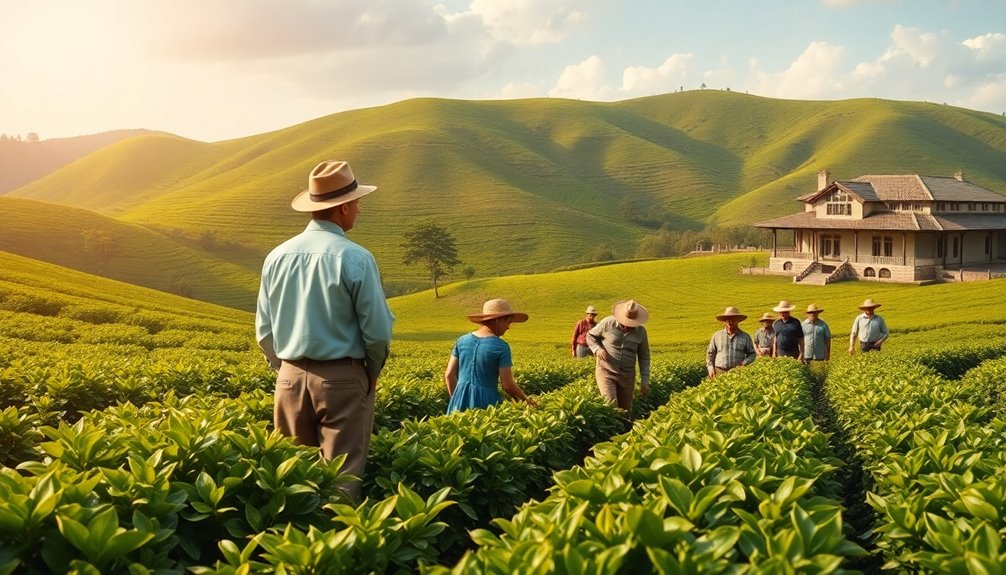
Tea’s deep roots in British culture and politics paved the way for a darker chapter in its history: the exploitation of tea production in colonial territories.
The British East India Company established a monopoly on tea imports during the 17th and 18th centuries, seeking to control production and distribution in India and China for profit. As colonial powers expanded their reach, they set up tea plantations primarily in Assam and Darjeeling during the 19th century. They relied on local labor, often enforcing oppressive practices to maximize yields.
The Opium Wars exemplified the extent of colonial exploitation, as Britain prioritized the trade of tea and other commodities, leading to significant societal and economic disruption in China.
The introduction of “coolie” labor systems on tea plantations involved recruiting indentured laborers from various regions, creating long-term social and economic impacts on local communities.
Practical Applications
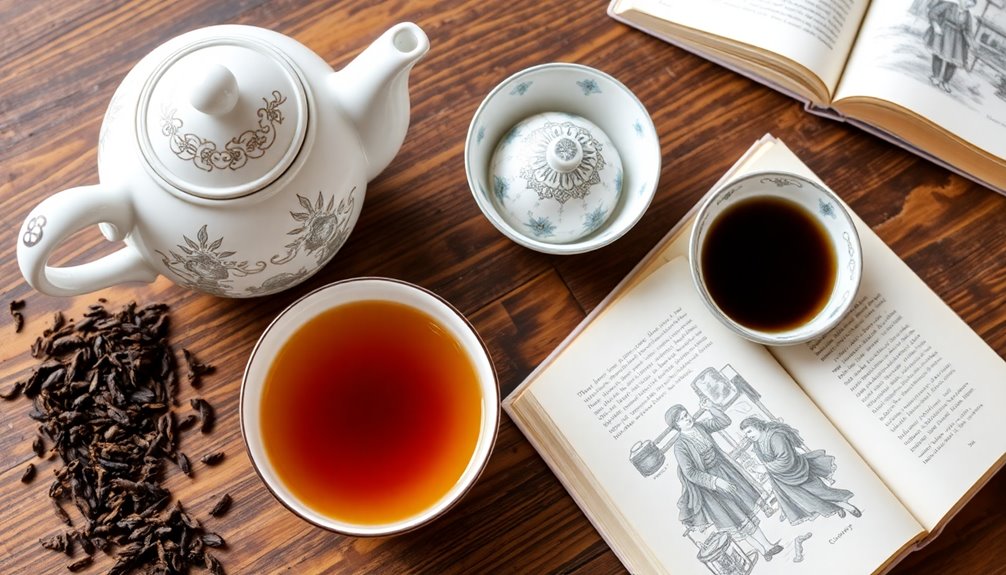
Exploring the practical applications of tea enriches your daily rituals and cultural experiences. The story of tea weaves through various cultures, offering you a chance to embrace traditions like the Japanese tea ceremony or the delightful British afternoon tea.
By immersing yourself in this world of tea, you gain a deeper understanding of its origins and significance.
An interesting book on tea can introduce you to diverse types, from Chinese green tea to Indian masala chai. Each variety presents unique flavors and health benefits of tea, encouraging you to make informed choices.
For instance, the antioxidant properties of certain teas can promote heart health, supporting your overall wellness.
When purchasing tea, consider opting for loose-leaf varieties that guarantee better flavor and quality. Recognizing the importance of the tea’s origin can elevate your experience, allowing you to savor the distinct characteristics of each blend.
Conclusion
As you’ve explored the rich history of tea, you can appreciate how this beloved beverage shaped cultures, economies, and politics around the world. From its deep-rooted traditions to its role in trade and colonial exploitation, tea’s story is both fascinating and complex. Now, when you sip your next cup, you’ll savor not just the flavor but also the centuries of history and significance that come with it. Cheers to tea and its incredible journey!

